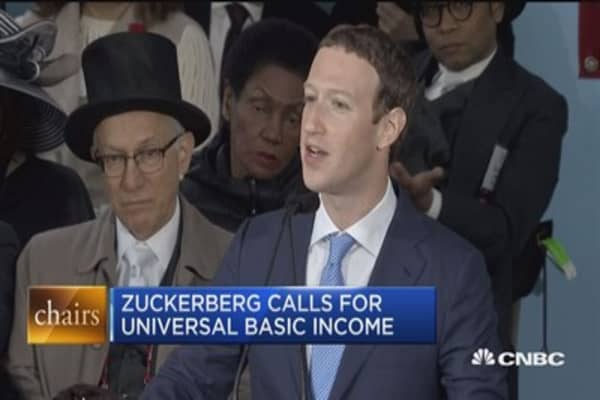

Imagine receiving a pile of cash each month from the government, no strings attached.
The concept sounds radical, but it’s an economic theory gaining traction from Silicon Valley to the Nordics, called universal basic income. Free money experiments are underway in a handful of countries as governments face evolving workforces and strained welfare systems.
What is universal basic income?
The International Monetary Fund defines universal basic income as “a cash transfer of an equal amount to all individuals in a country.”
Universal basic income differs from other government transfers, like tax refunds or welfare payments, in that every individual receives the same amount. Recipients can spend the money however they like, and they aren’t required to report how they spend it.
Who supports it?
Tech titans in Silicon Valley like Tesla CEO Elon Musk and Facebook CEO Mark Zuckerberg are some of the biggest advocates of universal basic income. They say free money could provide flexibility for workers who could lose their jobs to robots or automation.
Imagine receiving a pile of cash each month from the government, no strings attached.
The concept sounds radical, but it’s an economic theory gaining traction from Silicon Valley to the Nordics, called universal basic income. Free money experiments are underway in a handful of countries as governments face evolving workforces and strained welfare systems.
What is universal basic income?
The International Monetary Fund defines universal basic income as “a cash transfer of an equal amount to all individuals in a country.”
Universal basic income differs from other government transfers, like tax refunds or welfare payments, in that every individual receives the same amount. Recipients can spend the money however they like, and they aren’t required to report how they spend it.
Who supports it?
Tech titans in Silicon Valley like Tesla CEO Elon Musk and Facebook CEO Mark Zuckerberg are some of the biggest advocates of universal basic income. They say free money could provide flexibility for workers who could lose their jobs to robots or automation.
But the idea has been around for centuries. Philosopher Thomas Paine proposed payments “made to every person, rich or poor” in his 1797 work “Agrarian Justice.”
In 1967, Martin Luther King Junior proposed a “guaranteed income” pegged to the median income level of society as a way to combat poverty.
Free-market champion Milton Friedman also advocated for a negative income tax, similar to basic income, as a way to simplify welfare and reduce bureaucracy.
Today universal basic income has support across the political spectrum. Senator Bernie Sanders has called it a “very correct idea” to address income and wage inequality, while some libertarians say it would provide a more efficient, simpler alternative to the existing welfare system.
Has it ever been done?
According to the Organization for Economic Development (OECD), no country has instituted universal basic income as a “a principal pillar of income support for the working-age population.” But several countries are experimenting with the idea in a small sample of the population.
Imagine receiving a pile of cash each month from the government, no strings attached.
The concept sounds radical, but it’s an economic theory gaining traction from Silicon Valley to the Nordics, called universal basic income. Free money experiments are underway in a handful of countries as governments face evolving workforces and strained welfare systems.
What is universal basic income?
The International Monetary Fund defines universal basic income as “a cash transfer of an equal amount to all individuals in a country.”
Universal basic income differs from other government transfers, like tax refunds or welfare payments, in that every individual receives the same amount. Recipients can spend the money however they like, and they aren’t required to report how they spend it.
Who supports it?
Tech titans in Silicon Valley like Tesla CEO Elon Musk and Facebook CEO Mark Zuckerberg are some of the biggest advocates of universal basic income. They say free money could provide flexibility for workers who could lose their jobs to robots or automation.
But the idea has been around for centuries. Philosopher Thomas Paine proposed payments “made to every person, rich or poor” in his 1797 work “Agrarian Justice.”
In 1967, Martin Luther King Junior proposed a “guaranteed income” pegged to the median income level of society as a way to combat poverty.
Free-market champion Milton Friedman also advocated for a negative income tax, similar to basic income, as a way to simplify welfare and reduce bureaucracy.
Today universal basic income has support across the political spectrum. Senator Bernie Sanders has called it a “very correct idea” to address income and wage inequality, while some libertarians say it would provide a more efficient, simpler alternative to the existing welfare system.
Has it ever been done?
According to the Organization for Economic Development (OECD), no country has instituted universal basic income as a “a principal pillar of income support for the working-age population.” But several countries are experimenting with the idea in a small sample of the population.
Finland launched a trial at the beginning of 2017 where 2,000 unemployed people will receive 560 euros (about $665) each month for two years. Researchers will assess how the free money affects recipients’ incentive to work, and the Finnish government hopes it might reduce bureaucracy in the existing welfare system.
Other basic income experiments are underway in the Netherlands, Kenya, Canada, and the United States.
How much free money are we talking about?
There is plenty of debate over the costs of universal basic income.
The 560 euros per month payment in Finland is roughly in line with the amount of unemployment assistance recipients would already receive from the government. Researchers in Finland said other benefits would need to be reduced to pay for a universal basic income across the country.
Yet, in a 2017 report, the OECD found that reducing existing benefits to pay for basic income could actually have a negative impact on poverty levels.
“Overall poverty rates (and gaps) can in fact increase significantly in countries that currently have tightly targeted systems of income support,” the report said.
Instead of replacing existing programs, some advocates say universal basic income should be an added benefit.
“The better way is to see basic income as a transformation of what’s already there,” said Louise Haagh, chair of the advocacy group Basic Income Earth Network.
cnbc.com


